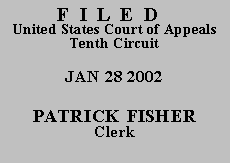

Plaintiff Wesley Purkey, a state prisoner appearing pro se, appeals the district court's dismissal of his 42 U.S.C. § 1983 action. We exercise jurisdiction pursuant to 28 U.S.C. § 1291 and affirm.
After being imprisoned for approximately seventeen years, Purkey was released on parole on March 1, 1997. While on parole, he allegedly began using a variety of drugs. Purkey alleges he repeatedly contacted his parole officers and requested placement in an inpatient drug rehabilitation program, but defendants took no action. In October 1998, while still on parole and working as a plumber, he murdered an elderly woman. According to Purkey, he was under the influence of crack cocaine at the time. He pled guilty to the murder and is currently serving a life sentence.
The essence of Purkey's complaint is that defendants, who are various officials employed by or otherwise connected with the Kansas Department of Corrections, were deliberately indifferent to his substance abuse problem and failed to ensure that he received proper treatment while he was on parole. Purkey alleges he would not have committed the murder and would not currently be imprisoned if it were not for defendants' deliberate indifference. Purkey alleges he is entitled to four categories of damages arising out defendants' alleged misconduct: (1) damages for the physical and mental suffering he endured as a result of his substance abuse problem while on parole, (2) damages arising out of his current inability to financially support his spouse and children, (3) damages resulting from the loss of freedom he has endured as a result of his murder conviction and sentence, and (4) punitive damages. The district court dismissed Purkey's complaint pursuant to 28 U.S.C. § 1915(e) for failure to state a claim upon which relief could be granted. The court noted that plaintiff had "identified no authority for a constitutional right to treatment, nor has the court's research identified such a right." ROA, Doc. 4 at 3.
After reviewing the record on appeal, we conclude the district court properly dismissed Purkey's complaint. Like the district court, we have found no authority establishing that a parolee has a federal constitutional right to drug or alcohol rehabilitation treatment. Cf. DeShaney v. Winnebago Co. Dep't of Soc. Servs., 489 U.S. 189, 200 (1989) (noting that the government's "affirmative duty to protect arises not from [its] knowledge of the individual's predicament or from its expressions of intent to help him, but from the limitation which it has imposed on his freedom to act on his own behalf"); Estelle v. Gamble, 429 U.S. 97, 103 (1976) (discussing the government's obligation under the Eighth Amendment "to provide medical care for those whom it is punishing by incarceration") (emphasis added). Further, it is clear that state corrections and parole officials have no duty to a parolee to prevent him or her from committing further crimes and being sent back to prison. Cf. DeShaney, 489 U.S. at 202 (concluding that social workers and other local officials "had no constitutional duty to protect [the child] against his father's violence"); Martinez v. California, 444 U.S. 277, 284-85 (1980) (concluding that state parole officials' release of parolee, who later killed third party, was deemed too attenuated to support claim that officials deprived plaintiff's decedent of life within meaning of the Fourteenth Amendment). Thus, Purkey's murder conviction and his sentence of imprisonment are not the "legally cognizable result of [the defendants' alleged] misconduct." Zahrey v. Coffey, 221 F.3d 342, 349 (2d Cir. 2000). Instead, it is Purkey who is responsible for his own predicament.
The judgment of the district court is AFFIRMED. The mandate shall issue forthwith. Purkey is reminded he must continue making partial payments of filing fees until paid in full.
Entered for the Court
Mary Beck Briscoe
Circuit Judge
*.This order and judgment is not binding precedent, except under the doctrines of law of the case, res judicata, and collateral estoppel. The court generally disfavors the citation of orders and judgments; nevertheless, an order and judgment may be cited under the terms and conditions of 10th Cir. R. 36.3.